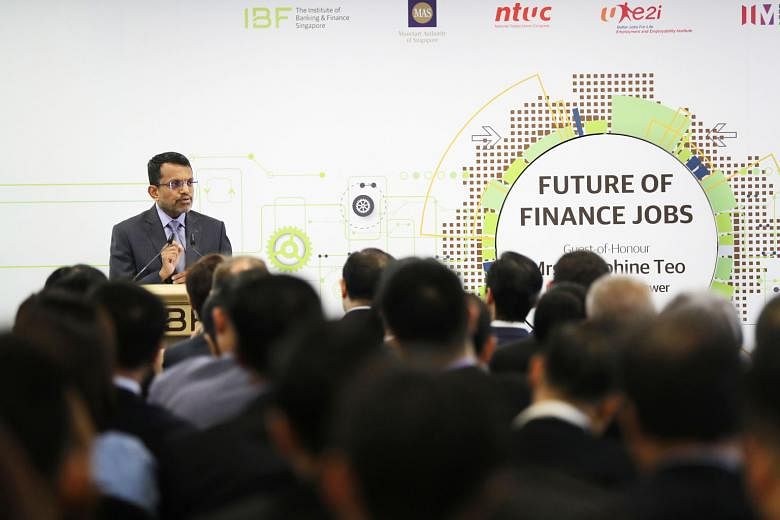Many repetitive tasks done by workers in the financial sector will become obsolete in the wake of technological change so employees must reskill to keep up, a report noted yesterday.
It found that about 100 out of 121 positions - including credit and loan officers, fund accountants and product managers - have tasks that risk being merged or displaced by automation or enhanced by data analytics in three to five years.
The report also pointed to the skills that each role will need to cope with the changes brought about by technology.
A relationship manager, for example, now prepares thorough financial analysis and regular credit reviews in accordance with a bank's guidelines to evaluate a customer's credit risk.
But machine learning could eventually analyse large data sets from various sources, allowing banks to model credit risk more accurately.
So relationship managers must develop lateral-thinking skills that will help them connect the dots and stay focused on the big picture, said the report, which was commissioned by the Institute of Banking and Finance (IBF) and the Monetary Authority of Singapore (MAS).
Another example is the formation of roles such as a bank's digital ambassador who will take on tasks now done by a teller, customer service officer and relationship manager.
A digital ambassador's tasks could include using analytics to predict customers' needs, managing chatbots and developing new businesses with his coverage and product colleagues.
The nine-month study by consultancy firm EY Singapore noted that the rise of data analytics and automation may not result in a shrinking workforce in the financial sector.
In New York, stronger demand for computer engineers made up for a fall in the number of traders at investment banks when computerised trading disrupted share trading about 20 years ago, the report pointed out, adding: "Few job roles, if any, would be entirely displaced by automation, without the need for human oversight or intervention."
As of December last year, Singapore's financial service industry employed 156,800 people.
Manpower Minister Josephine Teo said during the report's release yesterday that the digital transformation of the financial service sector brings about enormous opportunities. But rapid changes of job roles can also be disconcerting, she noted, adding that the report's usefulness is that employees can pick out the skills they need to improve on in their jobs.
MAS managing director Ravi Menon said at the event: "Many of the jobs we have been doing all these years have not disappeared, but the tasks we do within (these) jobs have changed substantially because of technology."
The report said employees need to recognise the need for lifelong learning and to constantly seek out opportunities to stay on top of the changes resulting from data analytics and automation.
Training providers, education institutes and financial institutions should work together to reskill workers with a useful curriculum, while the Government should focus on driving the adoption of common baseline skills, it added.
"While a variety of skills are required for job holders to successfully navigate the transformation of their respective job roles, the Government can place more of its efforts towards helping job holders become more tech-enabled," the report said.
Mrs Teo also announced a professional conversion programme that will equip mid-career workers with skills for jobs in technology areas, including cloud computing, cyber security and data analytics.
Successful applicants will go through structured and on-the-job training with participating financial institutions such as DBS, OCBC and United Overseas Bank for up to two years. They could also be offered permanent employment.


